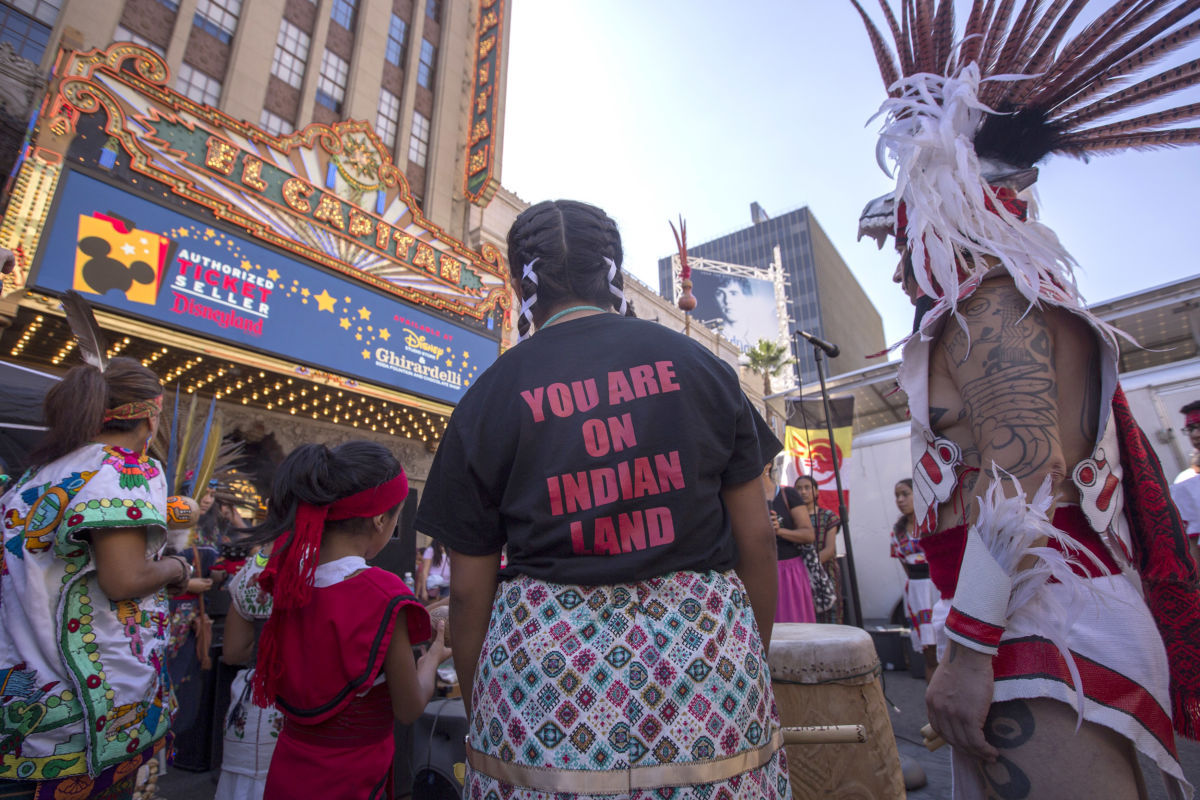Honest, paywall-free news is rare. Please support our boldly independent journalism with a donation of any size.
There is this magical made-up time between Indigenous Peoples’ Day (“Columbus Day” for the unenlightened) and Thanksgiving, when white Americans think about Native people. That’s sort of our window. Honestly. In the middle of this window is that Halloween thing, and until about three years ago, one of the most popular Halloween costumes was Pocahontas. Essentially, people know nothing about us, but like to dress up like us, or have us as a mascot.
Take it from me: No one can name us. If we are named, it is only Lakota, Cherokee, Navajo, Cheyenne, Blackfeet — mostly Native people from westerns, or maybe that Cherokee great-great-great grandmother someone believes they have. This is the problem of history — writing out the victim, making the victim disappear, because if there is no victim, there was no crime.
Now, let me tell you the truth: I think about white people every day — every day.
What do I want to tell non-Native people while they are thinking of me during this narrow window of time? First, thanks for changing those Columbus Day celebrations; some cities have moved on. More need to follow suit. (You can still keep those Columbus Day sales — just pick another person to name them after … someone who wasn’t responsible for mass killings and torture.) Additionally, let me squeeze this short history lesson in: There are over 700 Indigenous nations in North America, and, in Guatemala and Bolivia, we are the majority population. Two Indigenous presidents have been elected: Evo Morales (Bolivia) and Hugo Chávez of Venezuela. We are doctors, lawyers, writers and educators.
We are here.
We are land-based and intend to stay that way. On a worldwide scale, Indigenous people make up 5 percent of the world’s population, but are guardians of 80 percent of the world’s biodiversity. I hear people talk about how the Americans gave us land. Treaties reserved land, and reservations were reserved. Yet what we have is ishkonigan (leftovers).
America was stolen or purchased for a pittance. President Andrew Jackson forced the removal of thousands of our people, and then sold our land. Historians point out that Jefferson’s Louisiana purchase knocked millions off of U.S. debt. Good deal – except for us. As to the tiny percent of our land base that remains, we intend to keep it. As to our treaties that were signed between our ancestors and European settlers, we intend to stand by them.
There may be more than 7,000 languages in the world today, and they are primarily Indigenous. Some languages are very close to disappearing. In North America, 52 Indigenous languages have been lost. Meanwhile, 46 languages only have one known Native speaker, and 357 languages are recorded as being spoken by fewer than 50 people. Thousands of languages are facing the risk of extinction. It’s called linguicide, the forced loss of a language. The U.S. government and churches actively facilitated this linguicide throughout the past several centuries. The UN declared 2019 the year of languages, and Lakota and Ojibwe are two of the strongest living languages in North America. We intend to keep our words.
And we intend to keep our spiritual and religious practices. I am not a Christian. It was not until 1978, with the passage of the American Indian Freedom of Religion Act, that Native people could freely practice our religions. But of course, those religious freedoms only extend so far. If someone wants to mine our sacred sites or put a golf course on them, all bets are off.
Native women are here, and we birthed this place. We created the agrobiodiversity of 8,000 varieties of corn, and a multitude of beans, squash and melon varieties that are now touted by big agriculture and the foundation. We are the ones whose hearts cannot fall on the ground, despite that my heart breaks every day, as I see an opioid crisis brought to us by the pharmaceutical industry, and see so many Native people who cannot get health care.
Native people remain. This year marks the 50th Anniversary of the Native Occupation of Alcatraz, the former prison on an island in San Francisco Bay, in 1969. Thousands of Indigenous people will remember that takeover, celebrate our lives and plan the future. There are millions of acres of national parks and monuments that should be, like Alcatraz, returned to Native people.
This day reminds us of the necessity to undo the legacy of Columbus. It reminds us of the necessity of reparations. The only compensation for land is land. Reparations and cooperation are our future. Not only do we expect non-Native Americans to think of us beyond this brief moment on the calendar, but after 50 years of renewed resistance, decolonization and recovery, we want you to join us in making things right.
A terrifying moment. We appeal for your support.
In the last weeks, we have witnessed an authoritarian assault on communities in Minnesota and across the nation.
The need for truthful, grassroots reporting is urgent at this cataclysmic historical moment. Yet, Trump-aligned billionaires and other allies have taken over many legacy media outlets — the culmination of a decades-long campaign to place control of the narrative into the hands of the political right.
We refuse to let Trump’s blatant propaganda machine go unchecked. Untethered to corporate ownership or advertisers, Truthout remains fearless in our reporting and our determination to use journalism as a tool for justice.
But we need your help just to fund our basic expenses. Over 80 percent of Truthout’s funding comes from small individual donations from our community of readers, and over a third of our total budget is supported by recurring monthly donors.
Truthout has launched a fundraiser to add 379 new monthly donors in the next 6 days. Whether you can make a small monthly donation or a larger one-time gift, Truthout only works with your support.
